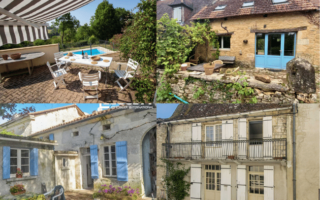Doing up the drains
If your French property isn’t on mains drainage, you may have to upgrade your existing system one day, says Mary Hall
In France, more than five million households are not connected to mains drainage, colloquially known as le tout � l’�gout (meaning all down the drain!). Typically these properties are in rural areas, and it’s on buying or holidaying in a French country cottage that many British people first encounter the words fosse septique and read instructions about what not to flush down the loo.
All waste water disposal systems at properties not on mains drainage are described as assainissement non collectif. Since 2006 these installations have been subject to periodic inspections designed to minimise pollution by checking that the systems work correctly and, in simple terms, are not flushing untreated human waste out into the nearest stream.
An inspector calls
The early controls established the scope of the problem, identifying outdated equipment and assessing the environmental and health risks posed by inadequate systems. Homeowners were visited by an inspector who looked at the system, noted the number of bedrooms in the house and logged whether it was occupied full-time or as a holiday home.
The inspector was expected to offer friendly advice to householders there and then, as well as subsequently providing them with a formal report including a plan and technical observations with any recommendations for improvement.
Some inspectors were more thorough than others, some annoyed the owners and a few were more draconian – but that’s human nature for you!
The authorities, often known as the SPANC (Service Public d’Assainissement Non Collectif), collated their findings. In Seine-Maritime for example, 8% of the installations conformed to the normes, 38% were not to standard but working okay, 24% presented a risk to the environment and 15% were a risk to health (15% were not inspected for a variety of reasons). In Lot, 19% met the normes, 41% were okay, 27% needed work and 12% were considered to present serious risks requiring urgent improvements.
Since then a lot of work has gone on behind the scenes. The lobbying consumers group CLCV (Conf�d�ration de la Consommation, du Logement et du Cadre de Vie) has been actively representing householders’ interests. Many people felt they were being overcharged for unnecessary inspections, and the CLCV is lobbying for the time between visits to be eight or preferably 10 years. Others complained that they had been subjected to over-stringent prescriptions for works or had to face intransigent bureaucrats unwilling to accept alternative solutions.
The authorities can only require improvements where the system is so bad that it constitutes a health risk or serious environmental pollution. For less serious defects they will make recommendations.
Can you get financial help with the cost of works? You could try for un �co-pr�t � taux z�ro sp�cifique assainissement non collectif of up to €10,000 if your house is your principal private residence. You’ll need a lot of patience, and be happy to jump through a lot of hoops: starting at www.developpement-durable.gouv.fr/ spip.php?page=article&id_article=7276.
For any homeowner, subject to the usual conditions, works to improve your system should benefit from the 5.5% reduced rate of TVA.
The problem with many of the Okay but not perfect’ systems lies not with the fosse, but with the treatment of the waste coming out of it. A fosse septique or a fosse toutes eaux only pre-treats the waste. What comes out still needs to go through a filter bed and, in older installations, this is often inadequate.
Clean water
A pipe coming out and draining down into the woods is no longer admissible, even if they are your woods. The type of filter bed, and how much it costs, depends on your particular ground conditions. The end product, clean water, must also be drained away through the ground. Puisards (soakaways) aren’t acceptable.
Some good news is that the authorities will now consider micro-stations, reed beds and toilettes seches (composting toilets that don’t use water) – though you may have to work hard to get approval from some of the more old-fashioned pen-pushers. There is also no requirement to empty (vidange) a fosse septique or a fosse toutes eaux every four years but it should be done when necessary, which will depend upon the use it gets and how you look after it.
Times are hard and no one likes spending money on things like foul drainage, which you only notice when they go wrong. If SPANC tell you the fosse needs emptying, do it: no, it’s not cheap, but if you don’t there’ll be a nasty problem, typically on 14 July or 15 August when your house is full of visitors and firms have shut down for weeks pour les cong�s.
If you have a grease trap (bac � graisse) that pre-treats waste water from the kitchen, get in the habit of cleaning it out. It’s a yukky but essential job, but do it regularly and it’s not so bad. Use products such as Eparcyl or Septifos to keep your fosse happy, and make sure you know exactly what you can and can’t dispose of down the sink or loo. No disposable nappies, tampons, disposable wipes, cotton wool, dental floss, hair, turps, paint, bleach, coffee grounds etc.
One reason why you might want to bring your system up to normes now is to get the mess out of the way – groundworks ruin your garden! If you’re planning a pool, garage, renovations or an extension, you don’t want to finish and then have to subject the garden to diggers and earthmoving all over again.
And finally, while you might think that all this paperwork is for nothing or just to keep the tree-huggers happy, beware. You may want to sell your house one day. From 1 January 2013, vendors of properties not on mains drainage will be obliged to supply the SPANC report so that buyers know what they are getting and where it is. Like the current termite and asbestos reports, any shortcomings usually result in price negotiations and delays.
This is already happening. Buyers are reading this and thinking: “Aha! I’ll get the notaire to include one of those clause suspensive things. I want to see that SPANC report before I sign.” Very sensible of them too.
Mary Hall is a chartered surveyor
Tel: 0033 (0)5 65 24 66 46
Share to: Facebook Twitter LinkedIn Email


